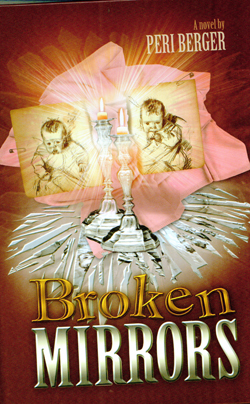Peri Berger, Broken Mirrors, Menucha Publishers, 2013, ISBN 978-1-61456-086-7, 270 pages, cover price unlisted.
By Donald H. Harrison
 SAN DIEGO–From the very beginning of this novel, its denouement is telegraphed. Students at a Jewish school express confusion and consternation when they meet Judy Rangler, their new secular studies teacher. She doesn’t wear a sheitel, but she looks almost like a mirror image of Sheva Bernstein, a popular Judaic studies teacher. Just coincidence?
SAN DIEGO–From the very beginning of this novel, its denouement is telegraphed. Students at a Jewish school express confusion and consternation when they meet Judy Rangler, their new secular studies teacher. She doesn’t wear a sheitel, but she looks almost like a mirror image of Sheva Bernstein, a popular Judaic studies teacher. Just coincidence?
Before anyone can find out, Mora Bernstein goes home on maternity leave. Mrs. Rangler–who is Jewish but nonobservant–begins to absorb the atmosphere of the Talmud Torah and the values of Orthodox Judaism.
Meanwhile, at the Hope Adoption Agency, Roiza Berman, its only Jewish employee, becomes fascinated after learning that 30 years before there were some baby placements that occasioned home-visit follow ups every Sunday for 10 years. This seemed excessive. Follow ups for a year? Maybe. But for 10 years? What was it about these babies, born in the early 1930s, that required such vigilance?
When the look-alike teachers finally meet, they dismiss their facial similarity as something odd. Mrs. Rangler’s 10 year-old-daughter, Susan, on the other hand is upset about another woman having her mother’s face. “You’re not my mother!” she shouts at Mora Bernstein
Although some of their mannerisms are similar, in their general demeanor the two teachers are quite different. Mora Bernstein has a sweetness about her that seems to bespeak her sense of spiritual well-being. Mrs. Rangler, on the other hand, seems more tense and far more uncertain of her true place in the world.
As the novel unfolds, so too do two investigations. Mrs. Berman actively pursues the mystery of the 1930s era babies. Quite passively, almost against her will, Mrs. Rangler learns more about Judaism, to which her adoptive parents had never exposed her in any depth.
The school has a Shabbaton on a weekend late in November 1963. It is the same weekend that President John F. Kennedy has been assassinated, which the Ranglers–who had been busy with other matters throughout the day–had not learned about until after the Shabbaton had began. The news of Kennedy’s assassination throws the Ranglers into emotional chaos, but, amazingly, other attendees at the Shabbaton, although distressed, are able to quiet their fears and speculation and to stay focused on the timely holiness of the day.
The Ranglers live too far from the school to walk back and forth from their home, so arrangements had been made for their family to stay over Shabbat with Rabbi Berman and his social worker wife, Roiza, who are members of the town’s small Orthodox community.
Here the subplots begin to intertwine towards a conclusion that will not surprise.
*|
Harison is editor of San Diego Jewish World. He may be contacted at donald.harrison@sdjewishworld.com
Pingback: Article Index for Family Historians - San Diego Jewish World